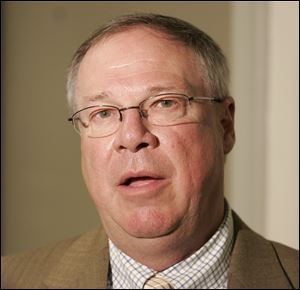
Toledo official joins testimony against Ohio labor plan
Collins: Bill won't improve state
3/11/2011
Toledo Councilman D. Michael Collins told lawmakers the current labor law is not broken.
It was the second day of limited protests at the Statehouse, but more than 70 witnesses filled a House Commerce and Labor Committee session to testify on Senate Bill 5. Nearly all were there in opposition to the bill.
Toledo City Councilman D. Michael Collins questioned committee members as to whether the bill would bring jobs to the state.
"Is it going to improve Ohio?" Mr. Collins asked. "The answer to that question is no. We are going to look like a bunch of irresponsible jerks."
He begged the committee to slow down the march toward changing a 27-year-old law that he said isn't broken.
Whatever lawmakers do, the issue is likely to end up on the November ballot because opponents of the bill have vowed to push for a repeal.
Many who testified Thursday were labor leaders, public employees, and Ohio government officials who said that Senate Bill 5 would erode union rights and the quality of public services.
Paula Anderson, a critical care registered nurse at Ohio State University's Ross Heart Hospital and president of the Ohio Nurses Association, said patient care improved through collective bargaining as nurses spoke out about the dangers of long shifts and low staffing levels. She argued that removing the right to collective bargaining on those issues could mean the erosion of care that publicly employed nurses provide.
"To remove the ability to negotiate these issues with management can only run the risk of patient care being compromised," she said.
Larry Cremeens, a member of the Ohio Civil Services Association, is a Vietnam War veteran who lost his right leg above the knee. He spent time as an outreach specialist for disabled veterans and worked on a union advisory committee that worked to support veterans.
"Without that union framework and collective-bargaining background, the union would not have been nearly as successful as it has been in looking out for this group of people," he said.
Senate Bill 5 would, among other things, outlaw strikes by all public employees, limit topics of discussion at the negotiating table to wages and terms and conditions of employment, allow government employers to implement a single health-care plan covering all its public employees, and require those workers to pay at least 15 percent of the cost.
After the controversial bill narrowly passed the Ohio Senate last week, the House began committee hearings Tuesday. The Republican-controlled House is expected to pass some version of the bill before the end of the month.
While most witnesses strongly opposed the bill, the first speaker expressed her support for the measure.
Rebecca Heimlich, Ohio director of the Americans for Prosperity, argued the bill is necessary to give local governments flexibility at a time when they are bracing for deep budget cuts from the state.
"Unions have tried to frame Senate Bill 5 as an attack on the middle class. It is not," she said. "It is only fair that Ohio implement reforms such as Senate Bill 5 that will bring government employee pay and benefits in line with private sector pay and benefits in Ohio."
But labor advocates said that any excesses are not because of collective bargaining, but because of poor leadership by governments.
Mr. Collins, a former Toledo police union leader, said collective bargaining does not create an unbalanced system. He said that in negotiations, taxpayers should look to their representatives, who he claimed have often failed.
"The system works," Mr. Collins said. "The problems with it are the participants."
Referencing the 1979 Toledo public employee strike, Mr. Collins warned the committee that the violence and chaos that followed could be repeated if Senate Bill 5 passes.
The assertion drew strong rebukes from Rep. Ron Young (R., Mentor), the committee's vice chairman, and Lynn Wachtmann (R., Napoleon). Both expressed disbelief that police and firefighters would abandon their posts.
"I can't believe you came and said what you did," Mr. Wachtmann said. "You condemned your elected officials, your voters, and your work force. I can't believe you did it."
"Well, I can't believe you understood what I said either, then," Mr. Collins responded.
Hearings on the bill are scheduled to continue on Monday, Wednesday, and Thursday, taking Tuesday off for Gov. John Kasich to unveil his proposed budget.
Contact Nolan Rosenkrans at: nrosenkrans@theblade.com, or 419-724-6086.